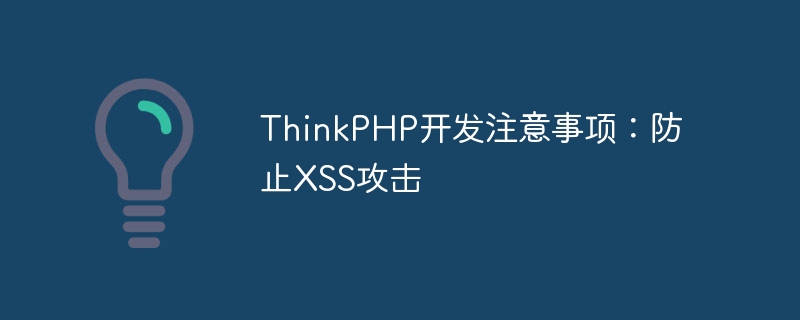

ThinkPHP is a popular PHP development framework that provides powerful features and easy-to-use tools, allowing developers to quickly build efficient web applications. However, during the development process, we need to pay attention to the common network security threat of XSS (cross-site scripting attack). XSS attack is a technique that injects malicious scripts to steal user information or spread malware. This article will discuss some precautions that need to be taken into consideration to prevent XSS attacks during the development of ThinkPHP.
First of all, we need to clarify some basic concepts. XSS attacks are mainly divided into two types: storage type (stored in a database or file, and output directly when obtained) and reflection type (passed to the browser through URL parameters and executed). Stored XSS usually occurs in web applications, where malicious scripts entered by users are stored in a database or file and read in subsequent requests and presented to other users. Reflected XSS usually occurs in URL parameters. Attackers trick users into clicking links containing malicious scripts and inject these scripts into web pages through URL parameters.
Next, we will introduce some precautions to prevent XSS attacks in ThinkPHP development.
User input is usually the most vulnerable link. Before receiving user input, we should strictly validate and filter it to ensure that the input content conforms to the expected data type and format. You can use the built-in validator provided by ThinkPHP for input verification, such asrequire,email,number, etc. In addition, you can also use filters to filter and remove potentially dangerous characters in user input, such as using thehtmlspecialcharsfunction to escape user input to avoid script execution.
When outputting data to the front-end page, appropriate escaping must be performed. You can use thehtmlspecialcharsfunction provided by ThinkPHP to escape the output content to ensure that any special characters are converted to their HTML entities, thereby preventing malicious script execution. In addition, ThinkPHP also provides a template engine that can use an automatic escaping mechanism in templates to protect output data.
When using Cookie and Session, you need to pay attention to the relevant security settings. By setting thehttponlyattribute, you can prevent JavaScript scripts from accessing cookies, thereby reducing the risk of XSS attacks. You can enable this property by setting theCOOKIE_HTTPONLYparameter to true in the ThinkPHP configuration file. In addition, you can also use the relevant configuration parameters of the Session to increase the security of the session, such as setting theSESSION_HTTPONLYparameter to true to prohibit access to the Session through JavaScript.
URL parameters are one of the common injection points, and attackers can trigger XSS vulnerabilities by passing malicious scripts in the URL. To prevent such attacks, we can use thehtmlspecialcharsfunction to escape URL parameters before receiving them. In addition, parameter filtering can also be performed in specific controllers or methods to ensure data security.
Timely updating ThinkPHP and other related software packages is an important part of keeping your application secure. The ThinkPHP development team regularly releases security patches and updates to fix known vulnerabilities and security issues. Therefore, we need to pay attention to the official website and email notifications in time, and update the framework version in time to ensure the security of the application.
To sum up, preventing XSS attacks is an important issue that every developer needs to pay attention to. During the development process of ThinkPHP, we should always keep these protective measures in mind, strictly verify and filter user input, properly escape the output content, set the security attributes of Cookie and Session, filter URL parameters, etc., in order to Ensure that our applications can better resist the risk of XSS attacks and protect user privacy and data security.
The above is the detailed content of Things to note when developing ThinkPHP: Preventing XSS attacks. For more information, please follow other related articles on the PHP Chinese website!
 readyfor4gb
readyfor4gb What are the differences between springcloud and dubbo
What are the differences between springcloud and dubbo What are the methods for docker to enter the container?
What are the methods for docker to enter the container? Introduction to xmpp protocol
Introduction to xmpp protocol What does STO mean in blockchain?
What does STO mean in blockchain? How to watch live broadcast playback records on Douyin
How to watch live broadcast playback records on Douyin laptop power
laptop power What is the difference between pass by value and pass by reference in java
What is the difference between pass by value and pass by reference in java



